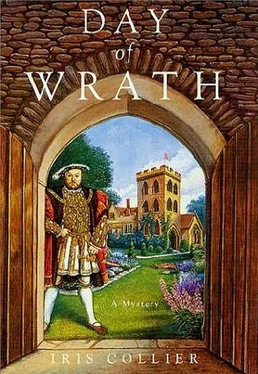Iris Collier - Day of Wrath
Здесь есть возможность читать онлайн «Iris Collier - Day of Wrath» весь текст электронной книги совершенно бесплатно (целиком полную версию без сокращений). В некоторых случаях можно слушать аудио, скачать через торрент в формате fb2 и присутствует краткое содержание. Год выпуска: 0101, Издательство: St. Martin, Жанр: Исторический детектив, на английском языке. Описание произведения, (предисловие) а так же отзывы посетителей доступны на портале библиотеки ЛибКат.
- Название:Day of Wrath
- Автор:
- Издательство:St. Martin
- Жанр:
- Год:0101
- ISBN:нет данных
- Рейтинг книги:5 / 5. Голосов: 1
-
Избранное:Добавить в избранное
- Отзывы:
-
Ваша оценка:
- 100
- 1
- 2
- 3
- 4
- 5
Day of Wrath: краткое содержание, описание и аннотация
Предлагаем к чтению аннотацию, описание, краткое содержание или предисловие (зависит от того, что написал сам автор книги «Day of Wrath»). Если вы не нашли необходимую информацию о книге — напишите в комментариях, мы постараемся отыскать её.
Day of Wrath — читать онлайн бесплатно полную книгу (весь текст) целиком
Ниже представлен текст книги, разбитый по страницам. Система сохранения места последней прочитанной страницы, позволяет с удобством читать онлайн бесплатно книгу «Day of Wrath», без необходимости каждый раз заново искать на чём Вы остановились. Поставьте закладку, и сможете в любой момент перейти на страницу, на которой закончили чтение.
Интервал:
Закладка:
‘Really? Then I’ll not take long. I’ll need to see all the servants, of course. One at a time. Have a room ready for me. Oh, a jug of your mulled ale will be welcome.’
‘Giles will see to it. Meanwhile, if I’m not wanted for the time being, I must get down to see Prior Thomas. Bad things are coming to the Priory and I must warn him. Not that he’ll take a blind bit of notice. He’s seen it coming for years and has done nothing about putting his house in order.’
‘What’s up? You’ve heard something at Court? Mind you, I’m all for change. Especially where the clergy’s concerned. Bloody parasites the lot of them, especially the monks.’
‘That’s a matter of opinion. But we’re talking about matters of state here, Richard. I’m just back from Hampton Court – the King’s gone there to avoid the sickness – and I was able to talk to Thomas Cromwell. He’s holding the reins of power at the moment; it won’t be long before he’s made Lord Privy Seal.’
‘What does the King see in him?’ said Landstock, as they made their way to the chapel.
‘Oh, he’s useful right enough. Knows which side’s his bread’s buttered. When the good Sir Thomas More is condemned, as condemned he will be, and soon, there’ll be no stopping Cromwell. But he’ll not last long, mark my words. He’s making too many enemies.’
‘These are dangerous times, my Lord.’
‘You can say that again. But I thank God that we’ve got a strong King. He’ll never let the country sink into civil war as it did in my father’s time. But he’s self-willed, and more to the point, he’s short of money. And that’s where our friend Cromwell comes in. He knows how to keep the King happy – provide him with enough money to pay for his lavish life-style and his fleet of warships out on the Solent.’
‘If he thinks he’ll get enough money by kicking out a lot of lazy monks, then good luck to him, say I.’
‘Richard, Richard, how can you say that? Haven’t you any feelings for the Priory? Haven’t you any sense of tradition? Our Priory’s been here for centuries. Remember it was my ancestors who founded it. The Peverells have always been its patrons. Just stop for a moment and think of what the monks do. They run the only school in the district. Their hospital is overflowing at the moment because of all the sickness around. They hand out alms. They’re good employers. Take away the Priory and you take away the village of Dean Peverell.’
They paused at the chapel door. ‘That’s how you see it, my Lord. I see a collection of lazy men living on the money which our people can ill afford. I see gold and silver plate used in their services whilst most people round here live in poverty. I’m told that my Lord Prior even uses silver plate at his table. I see wealth in the midst of poverty, and exploitation of humble people – for instance the prices they charge for the use of their mill in Marchester are higher than any one else’s. As for prayer, I’m told Thomas Rymes enjoys archery contests rather more than saying his prayers and a good meal rather than fasting. No, my Lord, I’m not with you on this one. Kick the lazy bastards out, I say. Let them work for a living for a change.’
‘You and Guy Warrener make a fine pair. He thinks the same way as you do.’
‘I know, and I admire him for speaking his mind. He’s a realist, like me. We must move with the times, my Lord. As for the monks, their days are over. Now let’s have a look at your unfortunate steward.’
* * *
Later, when the Coroner had arrived and the cause of death had been confirmed, the Sheriff and his clerk started on the lengthy process of taking statements from the servants. There was no obvious need for Nicholas to stay at home. He’d only get in everyone’s way. Meanwhile, he had to see the Prior. For once, Nicholas dreaded the interview. Thomas Rymes was a stubborn man. He lived in the past, that was his trouble, thought Nicholas, as he went over to the stables. Now Landstock, insensitive and brash as he was, was typical of the new type of man emerging. Pragmatic, materialistic, always chasing after new ideas coming over from the Continent, always looking for the main chance. He’d survive, though, as long as he kept his nose clean, and that was more than you could say about idealists like Sir Thomas More, locked up in the Tower preparing to meet his Maker, and Prior Thomas, refusing to see changes coming until he was overwhelmed by them.
Harry greeted him with a joyful whinny. He was fully recovered after yesterday’s gruelling ride. The grooms had fed him well, and his black coat shone like a mirror. Nicholas loved all his horses, but he favoured Harry more than the others. There was a big dash of Arab blood in him, which, coupled with the strength of the English war horse, made a formidable combination of beauty, swiftness and strength. Once again, Nicholas sent up a prayer of thanks to his crusading ancestor who had come back from the wars against the Infidel, bringing with him a pair of Arab horses. From these two he’d built up a stock of horses which were the best in the county.
He saddled Harry himself, mounted, and one of the grooms opened the main gate. Then he rode down the long drive towards the village of Dean Peverell.
The first Lord Peverell had built his house at the foot of the South Downs from where he could see the five channels of Marchester harbour shining like bright swords in the summer sunshine. The village was just a single street with cottages on either side. A track led up to the Priory which the first Lord Peverell had founded, bringing the first monks over from his local abbey in Normandy. As the low tower appeared above the surrounding trees, Nicholas reined in Harry. Suddenly, he saw the Priory as if for the first time. It was doomed. King Henry was set on its destruction. And he was going to justify his act of vandalism by trumping up charges of licentious behaviour against the monks. Charges which, he knew in advance, would be grossly exaggerated. Admittedly the Prior was over-fond of the pleasures of the table and drank too freely of the fine Bordeaux wines which he bought from the French vintners. But there was no harm in that, thought Nicholas as he rode up to the gatehouse of the Priory. After all, most of the other pleasures were denied him; surely he was entitled to one harmless indulgence.
It was unfortunate that the Priory, even if it was small, represented a great deal of wealth, he thought. There were only seventeen monks but over the centuries they had acquired lands in other parishes and collected rents from mills and quarries all over the county. Also there was a fine collection of church furnishings – a gold altar frontal, silver candlesticks, a jewel-encrusted icon of the Virgin and Child brought back from the East after the sack of Constantinople. And then there was the chalice, solid gold and encrusted with rubies. Now that was beyond price. He had to warn Prior Thomas about that. Cromwell’s inspectors must not set eyes on it. Even if he couldn’t stop the King from closing the Priory, he could urge the Prior to hide its treasures.
The gatekeeper welcomed him and took Harry’s reins.
‘The Prior, my Lord, is in his house. We are all pleased to see you back safe and sound.’
‘Thank you, Brother Ambrose. Peace be with you.’
As always, the tranquillity of the Priory moved him as he walked across the cloisters where some of the Brothers were at work on their manuscripts, making the most of the fine day. The Prior’s house stood apart from the main monastic buildings, because it also served as a guest house and it was undesirable that the monks should be in too close a proximity to the visitors from the outside world. Built at a later time than the rest of the buildings, it stood in its own grounds, a large three-storeyed building, built of local flint-stone, its thick walls pierced by elegant windows with pointed arches. The entrance door stood open, and he went into the kitchen area where a fire burned in the great fireplace, and a pig rotated on a spit in front of the flames. Brother Cyril, the Prior’s steward, smiled a greeting and took him upstairs to the first floor, where Prior Thomas had his study. The door was open, and Nicholas went in.
Читать дальшеИнтервал:
Закладка:
Похожие книги на «Day of Wrath»
Представляем Вашему вниманию похожие книги на «Day of Wrath» списком для выбора. Мы отобрали схожую по названию и смыслу литературу в надежде предоставить читателям больше вариантов отыскать новые, интересные, ещё непрочитанные произведения.
Обсуждение, отзывы о книге «Day of Wrath» и просто собственные мнения читателей. Оставьте ваши комментарии, напишите, что Вы думаете о произведении, его смысле или главных героях. Укажите что конкретно понравилось, а что нет, и почему Вы так считаете.












